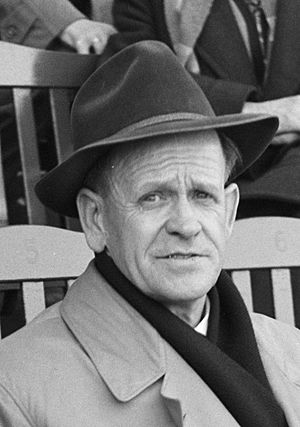Sepp Herberger facts for kids

Herberger in 1957
|
||||||||
| Personal information | ||||||||
|---|---|---|---|---|---|---|---|---|
| Full name | Josef Herberger | |||||||
| Date of birth | 28 March 1897 | |||||||
| Place of birth | Mannheim, German Empire | |||||||
| Date of death | 28 April 1977 (aged 80) | |||||||
| Place of death | Weinheim-Hohensachen, West Germany |
|||||||
| Position(s) | Striker | |||||||
| Senior career* | ||||||||
| Years | Team | Apps | (Gls) | |||||
| 1914–1921 | Waldhof Mannheim | 127 | (101) | |||||
| 1922–1926 | VfR Mannheim | 66 | (55) | |||||
| 1926–1930 | Tennis Borussia Berlin | 43 | (30) | |||||
| Total | 236 | (186) | ||||||
| International career | ||||||||
| 1921–1925 | Germany | 3 | (2) | |||||
| Managerial career | ||||||||
| 1928–1929 | SV Nowawes 03 | |||||||
| 1930–1932 | Tennis Borussia Berlin | |||||||
| 1932–1933 | Western Germany | |||||||
| 1932–1936 | Germany (assistant coach) | |||||||
| 1936–1942 | Germany | |||||||
| 1945–1946 | Eintracht Frankfurt (interim) | |||||||
| 1950–1964 | West Germany | |||||||
|
||||||||
| *Club domestic league appearances and goals | ||||||||
Josef "Sepp" Herberger (born March 28, 1897 – died April 28, 1977) was a famous German football player and manager. He is best known for leading the West German national team to victory in the 1954 FIFA World Cup. This amazing win is often called The Miracle of Bern. His team beat the strong Hungarian team in the final. Before this, he also coached the Breslau Eleven, which was one of Germany's best football teams ever.
Contents
Sepp Herberger's Early Life and Football Journey
Sepp Herberger was born in Mannheim, Germany. He grew up in a family that didn't have much money. His family moved to Mannheim to work in a glass factory.
Playing for Germany
Herberger played football for the German national team three times. He played between 1921 and 1925. After his playing career, he became an assistant coach.
Becoming a National Coach
In 1932, he became an assistant to Otto Nerz. Herberger took over as the main national coach in 1936. This happened after Germany lost to Norway in the 1936 Olympics. After World War II, he briefly coached Eintracht Frankfurt. Then, in 1950, he was called back to coach the national team. He stayed in this important role until 1964. After that, Helmut Schön became the new coach. Sepp Herberger passed away in 1977 at the age of 80.
The 1954 World Cup: The Miracle of Bern
The 1954 FIFA World Cup was a huge event. Many people thought Hungary would easily win. Their team, known as the Golden Team or Mighty Magyars, had not lost a game in four years. They were also the current Olympic Champions.
Hungary's Strong Start
Hungary had been very strong in the World Cup. They scored 17 goals and only let in 3 goals in their first two group games. West Germany, on the other hand, had scored 7 goals and let in 9. When Hungary and West Germany played each other earlier, Hungary won by a score of 8-3.
The Final Match
The final game was played in heavy rain. Hungary quickly scored two goals, taking a big lead. But Germany fought back! They scored one goal within two minutes, and then tied the game eight minutes later. Hungary had many more chances to score, but they couldn't. With only six minutes left in the game, West Germany scored again! They won the match 3-2.
Herberger's Smart Moves
Many people believe Herberger's clever decisions helped Germany win. For example, in the first game against Hungary, he used a weaker team. This helped hide his team's true strengths. He also made sure that Fritz Walter, a key player, had help on defense. This allowed Walter to focus on attacking. Herberger also told his team to attack the Hungarian goal from the sides, not just the middle. These tactics helped create "The Miracle of Bern."
Sepp Herberger's Coaching Achievements
Sepp Herberger had a long and successful career as a coach. He managed the German national team for many years.
Managerial Record Highlights
- From 1936 to 1942, he managed Germany in 70 games, winning 42 of them.
- From 1950 to 1964, he managed West Germany in 97 games, winning 52.
- In total, he coached 167 international games, winning 94 of them.
Awards and Honours
Sepp Herberger received many awards for his contributions to football.
As a Player
- VfR Mannheim
- South German Championship: 1925
As a Manager
- West Germany
Individual Awards
- Berlin-Britz Manager of the Decade (1950s)
- World Soccer 20th Greatest Manager of All Time: 2013
Film Appearances
- The Big Game (1942)
Images for kids
See also
 In Spanish: Sepp Herberger para niños
In Spanish: Sepp Herberger para niños
 | Aaron Henry |
 | T. R. M. Howard |
 | Jesse Jackson |

